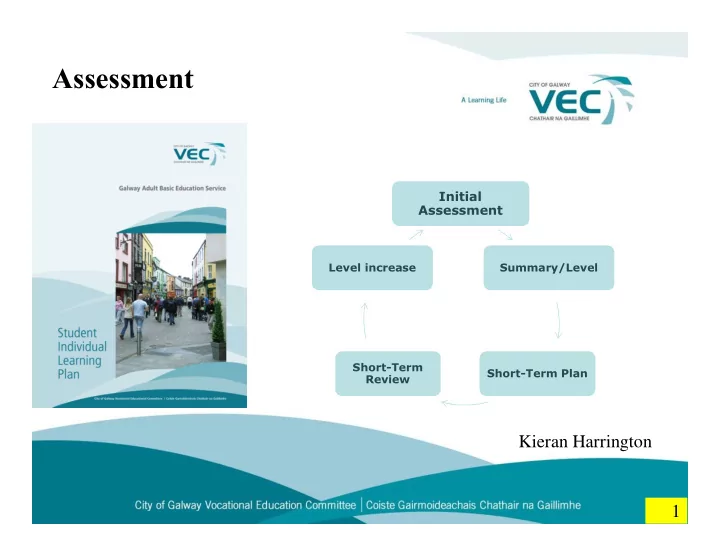

Assessment Initial Assessment Level increase Summary/Level Short-Term Short-Term Plan Review Kieran Harrington 1
Initial Assessment � Informal interview � No formal testing � Combination of self-assessment (subjective) and expert evaluation (objective) � Informal observation of reading and writing skills using set texts Initial assessment is linked to our framework of continuous assessment through an ILP, and to the context of the student as far as time, place and circumstance are concerned. So there is both systematicity and specificity 2
Initial assessment document: 5 pages Can do skills in reading, writing, speaking and listening, and numeracy Contextual Confidence information Schemata Self-awareness A level (1-3) is established for each of the above following the ITABE scheme 3
Initial Assessment Document (5 pages) 4
Measuring confidence � Confidence specifically related to reading, writing, speaking and listening and numeracy This is done in a similar way to ITABE cognitive measurement with a scale of 1-3 with specific criteria � General confidence General confidence may seem difficult to determine and measure, but for those with long experience of working in adult literacy, there are significant indicators which tie in with the measurement of confidence in reading and writing events. 5
Confidence in specific skills 6
General confidence indicators Personal growth perceived on monitoring progress I nitial assessment monitoring Curriculum input Critical reflection Physical bearing Evangelization Anxiety Reassessment of reason for literacy difficulty Metaphorical voice Enunciating more clearly Attitudes Social interaction in the centre Physical voice Making eye contact Self assurance Standing upright Defeatism Self-reliance Embarrassment Weighing up evidence Self-distrust Expressing opinion Alarm Personality revelation Dread Contribution to the centre Work Going into a group class Learning autonomy 7
Contextual information We gather information on the student � s Schematic knowledge in relation to the learning goal, and we monitor their degree of Self-awareness 8
Genre (text type) Form Language Register Layout Schemata Family School Content Social networks Learning style Learner autonomy Work Culture Language/dialect Attendance Preference Self assessment of reasons for literacy Context difficulties Dyslexia, school Social barriers, etc. Learning style Learner autonomy Self- awareness Confidence Sense of identity Attitudes Feelings 9
10
11
Schematic knowledge � Bartlett, F.C. (1932). Remembering: A Study in Experimental and Social Psychology . Cambridge, England: Cambridge University Press. � E. Reynolds, Marsha A. Taylor, Margaret S. Steffensen, Larry L. Shirey, and, Richard C. (1981) � Cultural schemata and reading comprehension. � Ralph. Anderson University of Illinois at Urbana- Champaign. � Carrell, L. 1987. Content and Formal Schemata. Volume 21 Issue 3. TESOL Quarterly Genre or text types/Language Functions Butt, D. 2000. Using Functional Grammar. Sydney: MacMillan Halliday, M.A.K. 1978. Language as a Social Semiotic. London: Edward Arnold Jacobson, E, et al. 2011. Creating Authentic Materials and Activities for the Adult Literacy Classroom: NCSALL 12
Initial Assessment Summary We establish: Levels (for each skill, confidence and context) A long-term Goal And we design a short- term plan 13
Initial Assessment Summary 14
15
Progress review When the short-term plan comes to an end, the tutor/learner and or assessor/coordinator review progress, and if appropriate, adjust the levels of reading, writing, speaking, listening, numeracy, confidence in these skills, and context, along the lines of the ITABE system 16
17
Gauging contextual progress 18
Texts, achievements, activities Apart from consulting numerical level increases, the student will welcome the opportunity to look back at texts, activities and achievements, and these may in fact mean more to the student than the numerical increases. Such recording is invaluable also for the tutor and the centre as far as self-evaluation is concerned. 19
Recording Achievements, Texts Used 20
Achievements � Affective personal achievement (I feel more confident) � Affective social achievement (I get on better with � ) � Socio-economic achievement (I was given more responsibility at work) � Enactive Achievement (I joined the library) � Cognitive achievement (I can read � ) Charnley, A.H. and Jones, H.A. 1979. The Concept of Success in Adult Literacy. London: Huntington 21
Conclusion Initial assessment combines self-assessment and expert assessment by the assessor through informal observation of reading and writing, and the gathering of contextual information. Initial assessment is a part of our overall integrated assessment system and Individual Learning Plan. The tutor, after the short term stage, compares progress with the initial assessment and establishes if there has been a level increase in the style of ITABE. 22
Recommend
More recommend